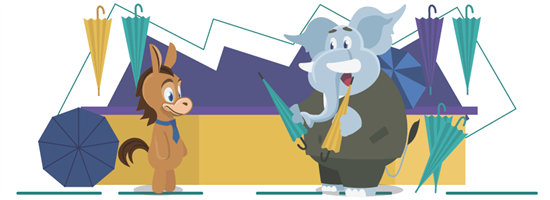What is Life Insurance and How Does It Work?
The benefits of life insurance may surprise you. Find out who needs it, and how life insurance works (in simple words).
 |
| © CreditDonkey |
What Is Personal Life Insurance?
In simple terms, a life insurance policy can be thought of as a check given to your beneficiary at your death.
It goes like this: You pay a monthly premium, and upon your passing, the insurance company will pay a lump sum amount to your beneficiary (called a death benefit). This amount is free from probate and is not taxed.
A life insurance policy is a unilateral contract. That means that as long as you pay the monthly premiums, the insurance company is committed to uphold the contract. But you're not obligated to pay either. If you stop paying, the policy will just lapse with no death benefit payout.
Later on, learn about the different types of insurance and how your premium is determined.
Why Do You Need Life Insurance?
We know it's kind of morbid to plan for your own death. But it's important to make provisions should something happen. Life is unpredictable and you don't want to leave someone in the lurch.
- Help offset the loss of your income.
- Pay funeral costs, outstanding debts and medical bills, and mortgage balance.
- Set up children's education funds.
- Serve as an inheritance for your children.
- Allow your family to pay off your business debts (if you're a small business owner).
- Relieve financial burden caused by your loss.
Basically, if you have anyone who will suffer financially if you're gone, it's smart to have life insurance. It provides peace of mind that your loved ones will be taken care of financially after you're gone. This doesn't mean just your spouse and kids. It's also necessary if you have dependent parents or own a small business.
If you have no dependents at all and no one will be impacted financially should you die, then you don't necessarily need it. This could be if you're a retiree with no spouse or children, or a young single person with no plans for a family.
Important Roles to Know
It can be confusing to understand the players in a policy. Here are the 3 important players and their roles.
- The Policy Holder
This is the owner of the policy. This person owns all rights to the policy and is responsible for the payments. Only the policy holder can make changes to the policy. You also have the option of transferring ownership to another person. - The Insured
This is the person whose life is insured. You can be the policy owner and the insured (insuring your own life). Or you can name another person as the insured. For example, you can purchase life insurance for your wife. - The Beneficiary
This is the person who will receive the death benefit. If you purchased life insurance for yourself, you will name another person as your beneficiary. Or you can be the policy owner and the beneficiary (with your spouse being the insured).
Types of Life Insurance
There are two broad categories of life insurance policies: Term Life and Permanent Life.
To put it simply, Term Life is straightforward and cheaper. Permanent Life has an additional savings feature, but is more expensive. Let's go over what they are.
Term Life Insurance
This is the simplest, cheapest, and most common type of life insurance. You select a specified term period (10, 15, 20, 25, or 30 years) and pay a monthly premium based on the term and policy amount. If you die during the term, your beneficiary will get a payout.
If you live to the end the term, you don't get a refund (sorry). But you would have had peace of mind knowing your loved ones were covered (and yay, you're still alive).
You can usually then convert all or a portion of the death benefit to a permanent policy (keep reading). OR you can keep going with your policy, but the premiums will be much higher (because you're older now with a higher chance of dying).
Permanent Life Insurance
Instead of a specific term, permanent life insurance has lifetime coverage (as long as the premium is being paid). These policies have significantly higher annual premiums.
This is like a life insurance plus an investment/savings plan. Besides the death benefit, there is also a cash value element. This is good because it's like having a savings account you can use for emergencies. The longer you have the policy, the more your cash value should grow.
There are a few different types of permanent life insurance:
- Traditional Whole Life
This policy generates guaranteed cash value. You are guaranteed gains on your cash value, in addition to the death benefit. Your premium also never changes from the day of purchase to death.Some whole life insurance policies pay dividends to the policy owner. Dividend payments are based on the financial performance of the insurance company. They are not guaranteed. You can cash out your dividend, use it to reduce the next premium, purchase additional life insurance, or let it accumulate interest. - Variable Life
The cash value return is not guaranteed. Instead, it depends on the performance of the underlying stocks and bonds. You could get greater gains with this, but there are greater risks as well. If performances are poor, your payout could be lower, but it shouldn't go below the original death benefit agreed upon amount. The premium is also fixed. - Universal Life: You can pay flexible premium amounts (within minimums and maximums). And you can increase or decrease your death benefit. You can choose how much you want to go into the death benefit and how much to go into cash value.
- Variable Universal Life
This is similar to Universal Life, but you can choose the investments you want to invest your premium in.
Once you have some cash value, you can borrow that money (like for help with a house down payment). The loan will have an interest rate. You do NOT need to repay the loan, but if you don't, your outstanding loan (plus interest) will be subtracted from your death benefit.
If you surrender the policy, the cash value will be paid to you minus any outstanding loans and interest.
If you die while still paying premiums, the policy will pay the death benefit (minus outstanding loans and interest) to your beneficiary. The cash value is NOT paid (the insurance company gets to keep it).
Term Life Insurance or Permanent Life Insurance?
They're kind of like the difference between renting an apartment and buying a home. Renting costs less on an annual basis but provides no refund when you move out. Buying has a high mortgage payment but it's also an investment and generates equity.
Which is the better financial decision? Let's break it down simply.
- Term Life Insurance
Is the hands-down winner if you want coverage for a stated period of time and are looking for the lowest annual premium. This may be a good choice for you if you don't have special needs children or own an estate. - Permanent Life Insurance
Should be considered if you want lifetime coverage, want flexibility to borrow, and can afford the annual premium. But, remember, though cash value is a savings component, it is not an investment. It may not provide as high of an investment return as traditional investment vehicles.A combination of term life insurance and permanent life insurance may be a solution. A term life insurance policy could cover your short-term needs, and some permanent life insurance could provide a long-term death benefit and cash accumulation.
Choosing which type of policy is best for you is a good discussion to have with your life insurance agent.
How Your Premium Is Determined
An underwriting (qualification) process determines your annual premium. This process assesses your likelihood of death based on your health conditions. The factors include:
- Age
- Occupation
- Tobacco usage
- Health history
- Lifestyle
Depending on the insurer's requirements, you may also need to take a medical exam and provide blood and urine samples. They may also request medical records from your doctor and your driving record. For larger policies, they may require your financial records and a telephone interview.
The underwriter reviews all that information and places you in a pool with other people with similar profiles. They estimate your life expectancy and then assign you to a rate class. Your rate class determines the premium. Someone who smokes will likely have a higher premium than someone who doesn't.
In some cases, the insurer may decline to offer you a policy due to unfavorable underwriting information.
Choosing the Right Amount of Life Insurance
Choosing the right amount can be a challenge. There are a ton of life insurance calculators that could provide you with the suggested amount. An agent can help you with that.
Here are some factors to consider when deciding how much you should get:
- How many years do you have to go until you retire and retirement benefits kick in?
- How much would you need for your children's education?
- What is your current remaining mortgage balance?
- How much debt do you have?
- What are your funeral expenses?
- How much savings and investments do you already have?
A good rule of thumb is to get enough that would replace your income for 10 years, cover your children's college costs, pay off your mortgage and other debts, and cover your funeral costs.
You determine that your family would need to replace 10 years of your income if you died. With an income of $100,000 per year, that would equal $1,000,000. You have 2 children who would need $100,000 each for college. And your remaining mortgage is $300,000. You already have savings that will cover your funeral costs. So in total, this comes out to $1,500,000 needed.
If you were a healthy 45-year-old, the premium for a $1,500,000, 20-year term life insurance policy would be approximately $120 per month.
Bottom Line
Life insurance is not a fun topic, but it's an important part of financial life. If you have dependents, your loss could be a huge financial burden. Life insurance will help to relieve that. It is the only financial instrument that creates an immediate death benefit for your beneficiaries.
Term life insurance is simple and cheap and provides a payout should you die within the term. Permanent life insurance policy has lifelong coverage and has an additional cash value benefit.
But life insurance is not just a one-time decision. As your family's financial needs change through the years, so will your life insurance needs. It is advisable to regularly review your life insurance and determine if your coverage remains appropriate.
Write to Ernest V at feedback@creditdonkey.com. Follow us on Twitter and Facebook for our latest posts.
|
|
| ||||||
|
|
|












